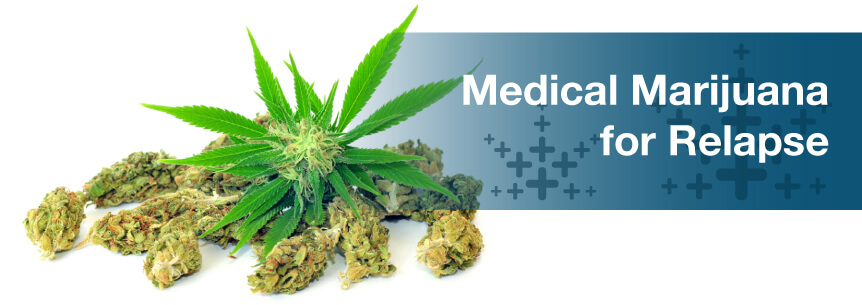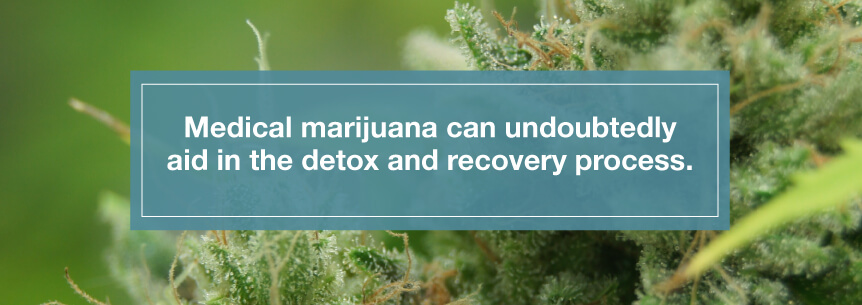
A chemical in marijuana known as cannabidiol (CBD) could help minimize the risk relapse for people who are addicted to alcohol and other drugs. CBD is the non-psychoactive element found in the medical marijuana plant — it’s also one of the plant’s two most prominent cannabinoids.
A pre-clinical study done with white rats revealed the potential of medical marijuana for relapse prevention. Similarly, physicians and drug recovery experts have been experimenting with the use of medical marijuana to help their patients recover from heroin, crack cocaine and opioid addiction. They claim to have found a relationship between the use of medical marijuana and addiction recovery.
CBD is one of the chemical compounds used as a treatment for different types of pain, psychiatric and neurological disorders like epilepsy. Now, it is being considered as a significant aspect of treatment for drug and alcohol addiction.
Here’s a brief review of a few studies showing the effects of medical marijuana on recovery from addiction and prevention of relapse.
Scientists at the Scripps Research Institute in California performed a test on addicted white rats to find out if cannabidiol could help them reduce their cravings for drugs. Their results were published in Neuropsychopharmacology.
As reported by the team’s lead researcher, Friedbert Weiss, the results of the pre-clinical study provide proof of the principle that supports the potential of CBD in medical marijuana for relapse prevention in two different aspects:
The researchers selected rats that behaved like addicts because of their frequent daily use of alcohol or cocaine. For seven days, the researchers applied a gel that contained CBD to the rat’s skin. The study revealed that the rats that had the CBD showed reduced impulsiveness and anxiety, which implied that CBD helped reduce relapse even with drug cues and stress.
After three days, the CBD had cleared out of the brains of the rats and blood plasma. After five months, the experimental rats still had a reduced relapse, even after they were induced with drug cues or stress.
Weiss observed that CBD is more likely to be effective in preventing relapse than treatments that target just one relapse vulnerability state. This is because drug addicts can become vulnerable to relapse for diverse reasons.
Medical marijuana could provide successful treatment for people who are addicted to heroin and other opioid painkillers. Addiction to opioids and other drugs like heroin has become an epidemic in the United States. Many patients who are addicted to heroin confessed to abusing over-the-counter (OTC) opiates before their heroin addiction.
Traditionally, drug rehabilitation centers use prescription medications to treat withdrawal symptoms that arise when a patient begins to abstain from drug use. Marijuana is now being considered a better alternative to drugs such as buprenorphine, methadone and naltrexone, which are all used to help patients overcome withdrawal symptoms and drug cravings.
The scientific journal JAMA published a study showing deaths from opioid overdose had fallen by 25% in states that allow the legal use of medical marijuana. Now, physicians are looking at ways to use marijuana to help people with opioid addictions. In Massachusetts, a group of patients was treated with cannabis to help them overcome their pharmaceutical addictions. After a month, three-quarters of the patients showed significant improvements.
At the High Sobriety drug rehabilitation center, Joe Shrank and his team focus on using cannabis for treatment of various types of addictions including crack cocaine, alcohol and heroin. Specifically, they use medical marijuana to help people detox from drugs.
Unlike drugs such as heroin, cocaine and alcohol, cannabis doesn’t have a known lethal dose. This has led to the successful use of cannabis to help patients stop using drugs that can be lethal by using marijuana instead.

Medical marijuana can undoubtedly aid in the detox and recovery process. It also helps patients with insomnia, discomfort and other flu-like symptoms that show up during withdrawal from drug use. The marijuana replacement procedure at this center is performed under medical supervision, and the marijuana used is handled like any other form of medication.
Shrank and his team now use marijuana to replace drugs like crack cocaine, which alters the brain and causes patients to experience severe pain and traumatic withdrawal symptoms. Marijuana helps treat the chronic pain and gradually enables patients to abstain from cocaine use completely.
Yasmin Hurd of the Addiction Institute School of Medicine of Mount Sinai believes cannabidiol (CBD) plays a vital role in the use of marijuana for treating drug addiction. Cannabidiol negatively modulates the brain receptors that make people feel high when they take drugs. CBD can, therefore, reverse some of the brain alterations that take place when one uses heroin.
In her study of cannabidiol, Hurd discovered heroin harms the transmitter system that’s necessary for decision making. However, CBD reversed the impairments caused by heroin. It also reversed damage caused by heroin to the cannabinoid receptors while activating serotonin, the neurotransmitter responsible for mood regulation.
Hurd believes there’s still a lot of research required to determine how cannabidiol reverses the anxiety and impulsiveness caused by heroin and other substances. But, because marijuana is still a Schedule I drug under federal law, it’s not yet possible to perform extensive clinical studies with it.
Currently, 29 states and Washington, D.C., have legalized the use of medical marijuana in the U.S. At MarijuanaDoctors.com, we are dedicated to helping patients who need certification find access to medical marijuana in legal states. If you believe you or a loved one could benefit from medical marijuana, search our database for a reliable doctor and marijuana dispensary near you today.
No Information on MarijuanaDoctors.Com should be used to diagnose, treat, prevent or cure any disease or condition. You can view our Full Disclaimer here.